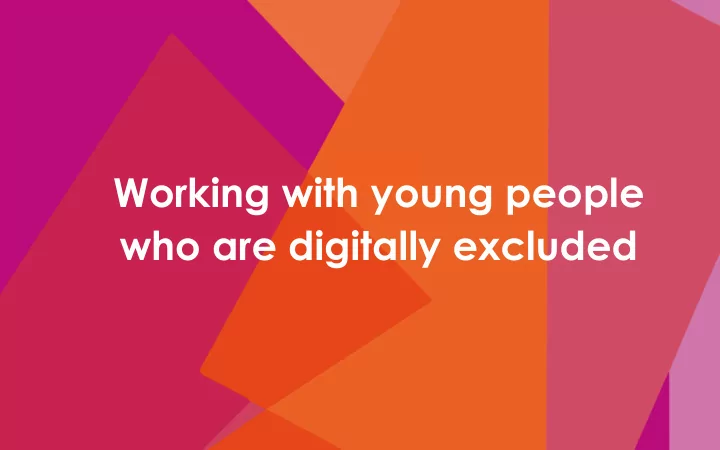

Working with young people who are digitally excluded
Introductions Photo Here Anna Grant Christina Watson Senior Policy and Development Head of Programmes Officer @christina_uky @Anna_CarnegieUK
Workshop Aims • Explore digital inclusion challenges specific to young people • Share best practice and learnings • Develop networks and signpost useful resources in this space
Young people are digital natives, right?
Young people are digital natives, right? “a person born or brought up during the age of technology and so familiar with computers and the Internet from an early age” 7% (or 500,000) young people 700,000 11-18 have no home aged 15-24 across the UK lack basic access to a computer or tablet digital skills (Lloyds Digital Index, 2018) (Nominet, Trust 2016)
What does digital exclusion look like for a young person? Consider their digital life: What do and what don’t they do online? • What do they enjoy? • How confident are they? • What devices do they have access to? • How do they connect to the internet? • Who pays? • Where (physically) do they go online? • What offline digital skills do/don’t they have? • What barriers prevent them from being digitally • included? Note your assumptions! Are there other life or context considerations • What else may influence their digital experience? •
Feedback
Some considerations Assumptions and presumptions around digital skills can be held by everyone, including • young people themselves. “Digital native” label can be harmful and produce shame and fear as barriers to learning (especially in groups) Access – growing number of ‘smartphone only’ households • Not just technical skills – social or behavioural skills online e.g. how to address an email • Wider skillsets – digital challenges can be compounded by other skills issues e.g. literacy. • Skill level – advanced skills in one digital area can mask lower skills in other digital • competencies. Context and motivation are key to engaging in discussions about ‘purposeful’ digital skills. • Adult support networks can significantly affect the digital mindset of a young person. • Identification – would you be able to identify a digitally excluded young person? •
What are the enablers for positive change? What are some principles of working with • young people experiencing digital exclusion? Which youth projects have been most • effective in having impact? What resources are available? • What can you take from other programme • not necessarily designed for young people?
Feedback
Recommendations from Specific consideration of vulnerable young people within digital participation strategies and digital within young people related strategies. Embedding digital skills learning into existing development programmes in formal and informal education settings. Provision of appropriate training for key support networks. Improve understanding into the compounding challenges e.g. basic literacy. More data about the extent, impact and implications of digital inclusion for all young people.
Learnings from Co-production is more powerful than ever with digital Trusted relationships are vital to give holistic support to young people facing complex barriers Front line staff need to have shared diagnostic tools & language. Referral partnerships are key. Digital skills “by stealth” and embedded in other delivery have been most effective Improving access is not one-size fits all – bespoke advice and grants for equipment have to suit needs Digital addiction & safety should be considered, built into approach and tackled head-on Digital fear in support staff doesn’t have to be a barrier – working together to learn the basics has proved to be a leveller Motivation to learn was most effective when digital could help specific goals e.g applying from UC Digital skill acquisition pace varies dramatically - outcomes measures better than time measures Be creative & ambitious ! Multi-format resources and approaches help different learners e.g Vlogs & portfolios “by starting them off with pretty advanced and exciting software, we piqued their interest and they wanted to learn – from there, we worked backwards to teach the basic digital skills that are the building blocks to the advanced stuff.”
“If we’re not careful, in 20 years time we’ll be picking up the pieces that others forgot about. We have a responsibility to include young people from all backgrounds in the conversation on how their future is being shaped through the advancement of technology.” Youth worker, Bradford YMCA
How was today? • What one thing did you learn from the workshop that will be most useful in your practice? • What one thing was missing for you and would potentially help you in your work?
Recommend
More recommend